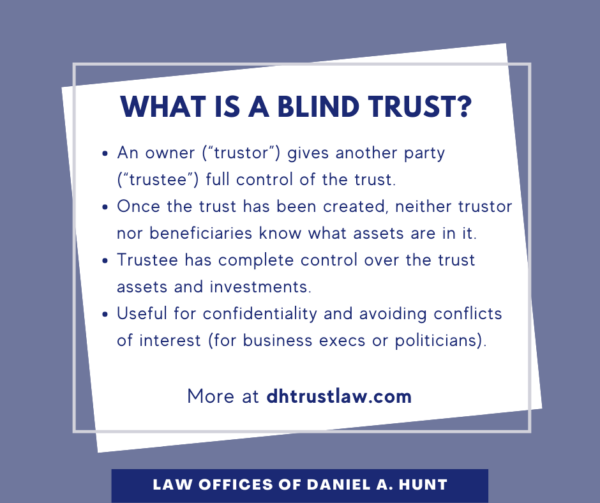What is a Blind Trust?

In a traditional trust, the trust creator and the trustee are usually either the same person or they communicate often to make decisions about the trust. But what if this arrangement poses a conflict of interest, or you would like to preserve the trust’s confidentiality? A blind trust is an estate planning tool that helps preserve confidentiality and minimize conflicts of interest.
What is a Blind Trust?
A blind trust is a trust established by an owner (the “trustor”) who gives another party (the “trustee”) full control of the trust. Neither the trustor nor the trust beneficiaries know what assets are held inside a blind trust. The trust assets and investments are completely controlled by the trustee.
A blind trust may be a revocable trust or an irrevocable trust. The trustor exercises no control over the trustee’s actions and receives no reports from the trustee while the blind trust is in effect. The only power the trustor maintains is the power to terminate the trust if it is revocable. If the trust is irrevocable, then the trustee continues until the designated time for the beneficiaries to inherit the assets.
Why Create a Blind Trust?
The two main reasons to create a blind trust are confidentiality and avoiding conflicts of interest.
Confidentiality
A blind trust can be useful to a person who doesn’t want the beneficiary to know about the trust or any trust activities, since the trust activities become confidential after creation. Sometimes the trustor will set up a blind trust so that the funds are distributed to the beneficiary once they reach the age of maturity or a certain milestone like marriage or college graduation.
Blind trusts can also be useful to lottery winners seeking to preserve their privacy and their winnings. Selecting a trustee to manage their personal finances can help preserve the winner’s anonymity and entrusts their new fortune to a trustee with experience managing investment portfolios.
Avoiding Conflicts of Interest
A blind trust can help two general types of individuals avoid conflicts of interest:
- Corporate executives or members of a company’s board of directors: Individuals with significant corporate stock holdings and access to inside information are restricted from trading securities. This can make it difficult to effectively manage their investment portfolio. But if the executive’s holdings are transferred into a blind trust where the executive can’t dictate when to buy or sell corporate stock, they can avoid these regulations.
- Politicians: Blind trusts can be especially advantageous for politicians. The Federal Ethics in Government Act of 1978 requires government officials to disclose their financial holdings unless the assets are transferred to a “qualified” blind trust. Thus, a blind trust eliminates the need for politicians to disclose personal assets and risk public scrutiny.
Being elected to public office can create a conflict of interest when that politician owns equity in a company that has a pending regulatory issue. They may also be tempted to use their influence over trade barriers if they own international investments. A qualified blind trust can help politicians avoid such conflicts of interest.
What is a “Qualified” Blind Trust?
In order to be considered a “qualified” blind trust under federal law, the trust must meet these requirements:
- Independent trustee: The trustee cannot be influenced by, affiliated with, or related to the trustor.
- Transferable assets: The trust assets cannot be restricted; they may be sold or transferred by the trustee without interference.
- Communication barriers: The trustor may not communicate with the trustee about the trust.
- Approval of trust and trustee: The public official’s supervising office must approve of the trust and the trustee.
How to Create a Blind Trust
If you’re ready to establish a blind trust, here’s a basic outline of that process:
- Consult with an experienced estate planning attorney regarding the optimal structure for your trust (revocable or irrevocable, how and when the assets will be dispersed, etc.).
- Gather the relevant documents for the assets you intend to transfer into the trust (such as property titles, financial account information, etc.).
- Select an entity (either an individual or firm) to serve as the trustee.
- Have your attorney draft the trust agreement.
- Sign and notarize the agreement.
- Transfer assets into the trust.
Blind Trust Limitations
Blind trusts are sometimes criticized because the trustor does know what assets they originally put in the trust, even if they aren’t actively managing them anymore. The trustor may still know what the trust is likely to contain. While a blind trust doesn’t eliminate all potential conflicts of interest, it is a helpful tool for minimizing the risks.
If you have any questions about this topic, feel free to contact our law firm.
Law Offices of Daniel A. Hunt
The Law Offices of Daniel A. Hunt is a California law firm specializing in Estate Planning; Trust Administration & Litigation; Probate; and Conservatorships. We've helped over 10,000 clients find peace of mind. We serve clients throughout the greater Sacramento region and the state of California.




